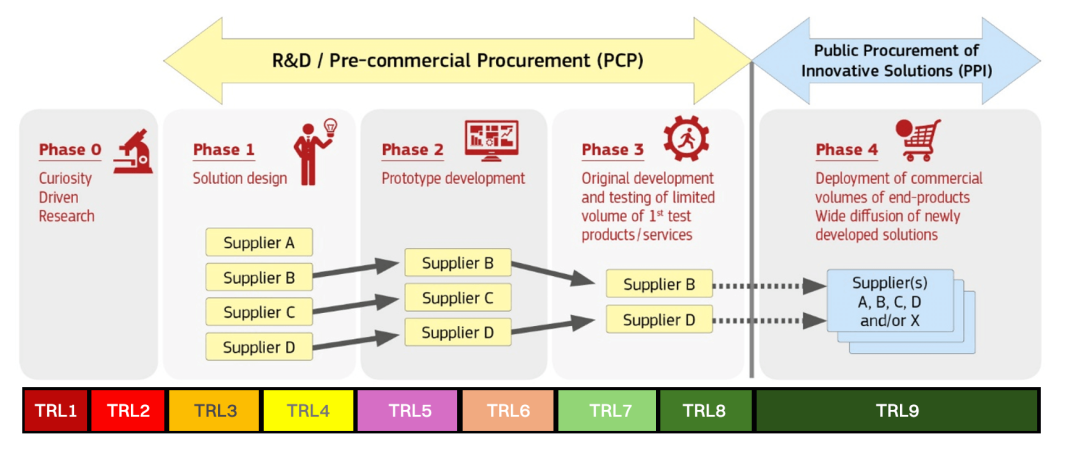As Europe faces rising water crises, PCP WISE brings innovation procurement to the forefront to develop smarter, scalable tools for real-time water management and climate resilience
The climate crisis and the water resilience challenge
Across Europe, climate change is no longer a distant threat; it is a growing reality affecting water systems. From floods and droughts to wildfires and infrastructure damage, the frequency and intensity of water-related crises are on the rise. These events reflect deeper imbalances in the soil-water-vegetation- atmosphere (SWVA) system, driven by shifting weather patterns and rising temperatures.
In response, the European Commission launched its Water Resilience Strategy in 2024, aimed at addressing worsening water stress across the EU. This framework aims to enhance water efficiency, strengthen integrated water management, raise public awareness, and reduce dependency on unsustainable extraction. It signals a shift toward coordinated action at the EU, national, and regional levels, placing resilience at the heart of environmental and economic planning.
Yet, implementation remains complex, and water management across Europe is fragmented. Regional authorities often rely on isolated hydrological models and local measurements that fail to provide a unified picture of the broader system. The result is inefficient crisis response, inconsistent data, and limited predictive capabilities that are poorly equipped to address today’s rapidly escalating climate challenges.
The PCP WISE project responds to this gap by proposing tools for monitoring the SWVA system and anticipating extreme events. By combining Earth Observation (EO) data, in-situ monitoring, and Artificial Intelligence (AI), it seeks to create standardised, interoperable tools for real-time analysis and decision-making. Ultimately, the project supports the EU’s water resilience vision across Europe’s rural and urban regions by empowering public authorities to act proactively and collaboratively.
Driving innovation through public demand: The PCP WISE approach
To tackle climate-related water risks, public authorities need practical tools. Yet, the current market falls short; most solutions are either underdeveloped, fragmented, or not tailored to the complex needs of water management. The PROTECT project confirmed this gap: no dominant technology exists, and many tools operate at low readiness levels or in isolation.
Innovation Procurement (IP) offers a strategic way forward. Rather than waiting for the market to deliver, public buyers can drive development by directly supporting the creation of new technologies. One powerful form of IP is Pre-Commercial Procurement (PCP) – a phased R&D process where public authorities collaborate with multiple suppliers to co-develop solutions that don’t yet exist on the market.
The PCP WISE project applies this model to boost climate resilience. Instead of buying ready-made products, public buyers launch a competitive process inviting several suppliers to propose, design, and test solutions in phases:
- Phase 1: Solution Design:
- suppliers submit detailed plans addressing the water intelligence challenge.
- Phase 2: Prototype Development:
- selected concepts are built and tested in lab environments.
- Phase 3: Field Validation:
- working prototypes are tested using real-world case studies and data.
This phased structure reduces risk, encourages experimentation, and improves quality. Multiple suppliers compete at each stage, ensuring diversity of approaches and giving small and medium-sized enterprises (SMEs) a fair chance. Intellectual Property Rights (IPR) remain with the suppliers, enabling commercial growth, while public buyers gain free access to results. Technical, financial, and administrative checks at each phase ensure quality and transparency.
By starting from public needs and involving stakeholders across Europe, PCP WISE helps public authorities stay ahead of climate risks – not by reacting to crises, but by shaping forward-looking solutions.
From vision to action: The scope and rollout of PCP WISE
Launched in January 2025 under the Horizon Europe programme, PCP WISE transforms the ambition of climate-resilient water management into coordinated European action. The project aligns with the European Green Deal, the EU Climate Adaptation Strategy, and specifically with the European Innovation Agenda’s Flagship on innovation procurement and experimentation spaces.
PCP WISE brings together 26 partners from nine EU countries: 12 public buyers led by het Waterschapshuis on behalf of the Dutch water authorities and 14 support organisations. With €12 million dedicated to fund R&D services of European market suppliers, the project focuses on developing a remote sensing-based prototype for a generic Soil-Water-Vegetation monitoring and risk assessment information service.
Five real-world use cases anchor the procurement:
- Urban drought in Northern Europe
- Urban flood in North-Central Europe
- Rural drought in Northwest-Central Europe
- Rural drought and flooding in Southern Europe
- Rural drought and flooding in Northern Europe
These scenarios reflect a diversity of climatic and geographic pressures, ensuring that developed solutions are robust, transferable, and need-driven.
To prepare the tender, PCP WISE carried out an Open Market Consultation (OMC), engaging over 60 entities from sectors such as civil engineering and management, hydrology, remote sensing services, crisis risk analysis, and impact assessment. The OMC included a Webstival in April, followed by an Infoday on May 28, the first online OMC event on June 3, and a second. hybrid OMC event on June 12. The consultation helped align the project’s scope with market capabilities, ensure feasibility, and foster early supplier interest.
This groundwork supports the Call for Tenders, launched on 5 September 2025, inviting a wide range of suppliers to co-develop water resilience tools up to TRL 8 by the end of the process.


